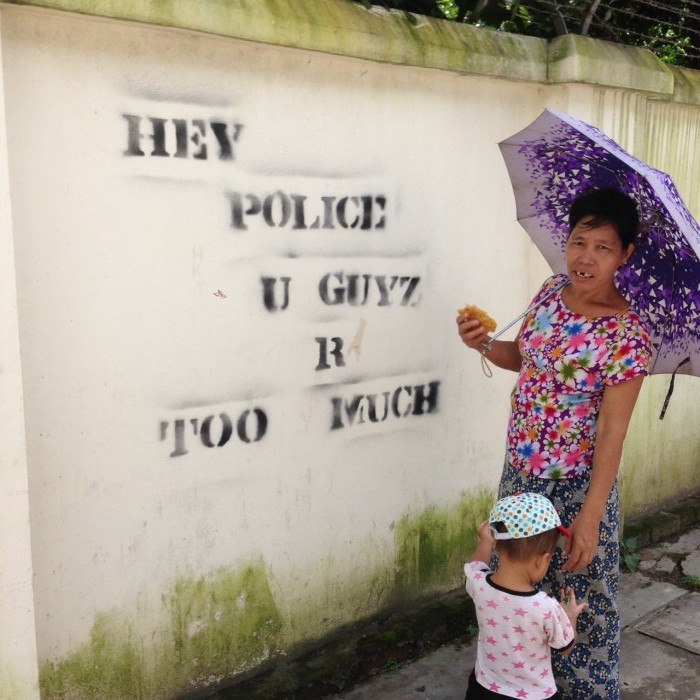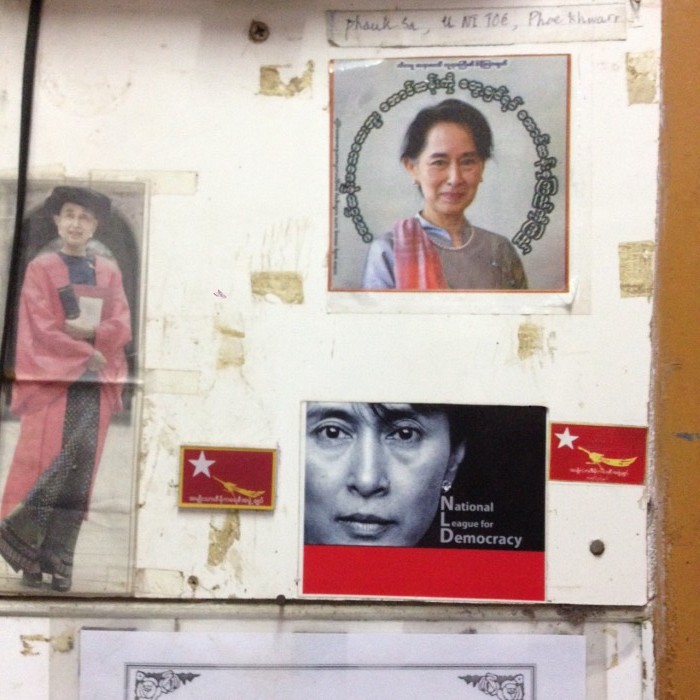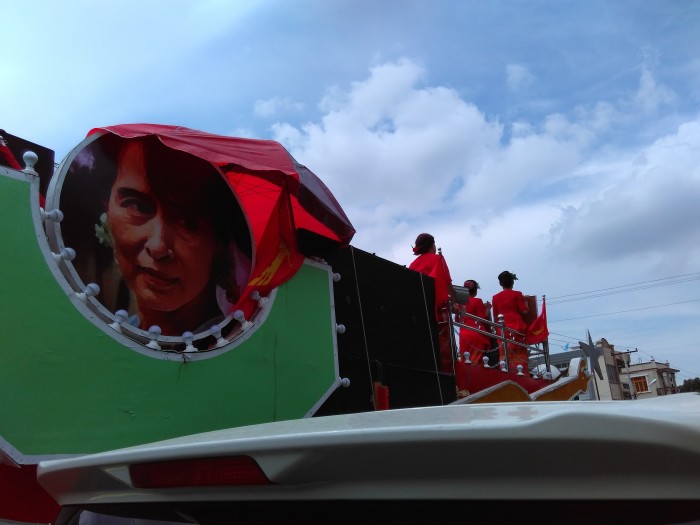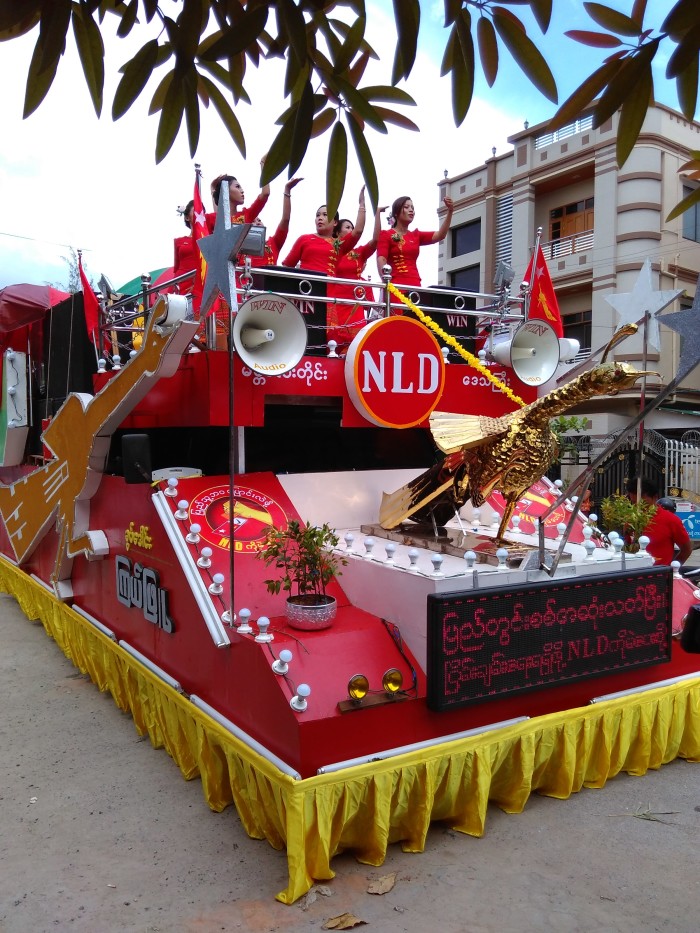Burma’s Open Mouths
‘Things will only change if she wins. If they let her in, there will be changes. If not, things will be stable’.
Pausing at a busy junction in downtown Yangon as I wait to cross, a heavy bag on my back, an older Burmese woman mutters under her breath telling me it is safe to cross. The midday heat has begun to settle in the gaps in the traffic and will not lift until the daily downpour around four.
The woman walks deliberately slowly but is evidently still close enough to me when we reach the curb opposite to continue the conversation. My impulse is to speed ahead but she isn’t finished with me yet. So, I slow my pace to match hers as she tells me that I must be surprised her English is so good because I have met so many Burmese people who cannot speak proper English. She continues: All the young people in Burma[1] are getting a bad education at the national schools and are having to pay for extra tuition (with the same teacher) outside school time – a scheme deeply entrenched in the country’s economics[2]. They do not learn good English, my companion assures me.

(Graffiti and bystander on the street in downtown Yangon)
The woman explains: This is all because the education minister will not get out of his seat (either to do any work or to make way for a minister who will improve things). When she grew up, the British education system was still in place – that is the reason she speaks English so well[3]. But now, only private international schools teach good English.
When my new advisor shares her political views with me, I don’t have to ask who ‘she’ is; she needn’t be named. She’s been on my mind constantly since I began seeing her photo pasted next to her father’s portrait or twinned with posters saying NATIONAL LEAGUE for DEMOCRACY above people’s houses, outside shops and in restaurants all across the country.
Aung San Suu Kyi, it seems, is all anyone can think about in Burma. Like her father, Aung San, once was, ‘she’ is the vehicle of hope that carries Burma ever onward to the upcoming November 8th election.

(Signs for NLD in a tourist guesthouse lobby)
With that, this talkative older woman turns left down a side street going south, muttering goodbye as she walks. Although I am desperately trying to remember every word, I am not surprised by the act of sharing. That, in itself, is a surprise.
Why should I be surprised? Well, ever since the military government seized power in 1962, any citizen speaking out against the government, whether privately or publicly, in earnest or in jest, has been threatened, arrested, imprisoned, sent to a labour camp, put under house arrest, or mercilessly executed. All of the country’s most famous pro-democracy activists have shared the same fate, including Aung San Suu Kyi, who has spent almost 15 years imprisoned in her own home since 1989.
Why stay silent?
Talking about voting preference usually stays within the family, or perhaps as far as the extended family or close community members. It is dangerous to discuss political matters with anyone you do not know well because there are government spies who will infiltrate communities or small villages, gather information and report names to government officials who will deal with opposition voters or troublemakers as they see fit, a Burmese friend Koko tells me. It can be extremely dangerous to speak openly in public.
My time in Burma quickly taught me that people are ready to talk. People have long been ready to talk. They just have to meet the right audience.
‘If NLD wins, freedom of speech begins. If USDP wins, we cannot do anything.’
(NLD campaign float in Mandalay, early September)
Why open up?
This summer, Koko said that he could speak freely (fairly freely), because there is an election coming up on November 8th.[4]
The election is an excuse for Burmese citizens to speak freely, for a change. I saw signs outside shops, billboards in the city, and houses blaring music and displaying posters. On September 6th, exactly nine weeks before election day, political parties were finally able to campaign. The USDP[5] volunteers were sour faced as they drove around Mandalay. NLD on the other hand, were cheery and energetic; in each neighborhood people poured out of their homes and businesses to greet the motorcade and big bus decorated with the party logo and a huge image of Aung San Suu Kyi, topped off with resounding music and a team of beautiful dancers on the roof.
At the same time, many peaceful activists and human rights defenders have recently been arrested and imprisoned in the run up to November 8th.

(NLD campaign float in Mandalay, showing Aung San Suu Kyi’s face)
People in Burma are oppressed and we can help.
Burma is at a turning point. The November elections build on the progress of Aung Sun Suu Kyi’s release from house arrest and acceptance into the Burmese government. But the safety of campaigners and transparency of the election are under attack at the same time. The last ‘free and fair’ election resulted in a victory for Aung Sun Suu Kyi only to be pushed back by a surprise amendment to the Burmese constitution. This election is already being plagued by attacks on free speech. The ongoing arrest and imprisonment of peaceful activists and human rights defenders in the country is reducing the pro-democracy electorate and the threat is enough to prevent many Burmese people from voting.
How can you help?
1. Petition international representatives in Burma.
Help Burmese voices be heard by signing Amnesty International’s petition to the European Union, UK, USA, Australian, and Japanese representatives in Burma. Click here to help free all prisoners of conscience.
2. Write to a local representative
You may need an international organisation to help you petition international representatives in Burma itself, but you can petition your local representative without a middleman. Click here for your step-by-step guide.
3. Get informed.
Read the full version of this article on Catherine and the Lion, or follow the links therein to learn more about the history of and current situation in Burma.
4. Help others get informed.
Please share this article by posting a link on social media and email all your friends.
If you enjoyed this post, why not check out ‘On Being a Female Traveler in India’?
N.B. All photos in this post have been taken by the author.
Notes from this post:
[1] The military government changed the country’s official name from Burma to Myanmar in 1989, without consensus from the Burmese people. Many pro-democracy figures, Aung San Suu Kyi included, do not acknowledge the change. The United States of America officially calls the country Burma, whereas the United Nations refers to the country as Myanmar. I prefer Burma.
[2] Children trying to sell things at tourist sites opine that they cannot afford the fees for extra tuition, not the actual school fees.
[3] Burma is one of the few countries in the world where parents are more educated than their children, due to a major decline in education standards since the military government seized power in 1962.
[4] This is not the first election to have raised hope for the people of Burma, but is perhaps the first in 25 years that NLD have any chance of winning. The NLD won an overwhelming majority of votes in 1990, but the military junta refused to relinquish power. NLD boycotted the October 2010 general election, as Aung San Suu Kyi was still under house arrest.
[5] USDP = Union of Solidarity and Development Party, headed by Sein Thein, current President of Burma (Myanmar).
Tags: activism Burma democracy free speech politics
Categories: Adventureland Fire me up baby! Wise up!
